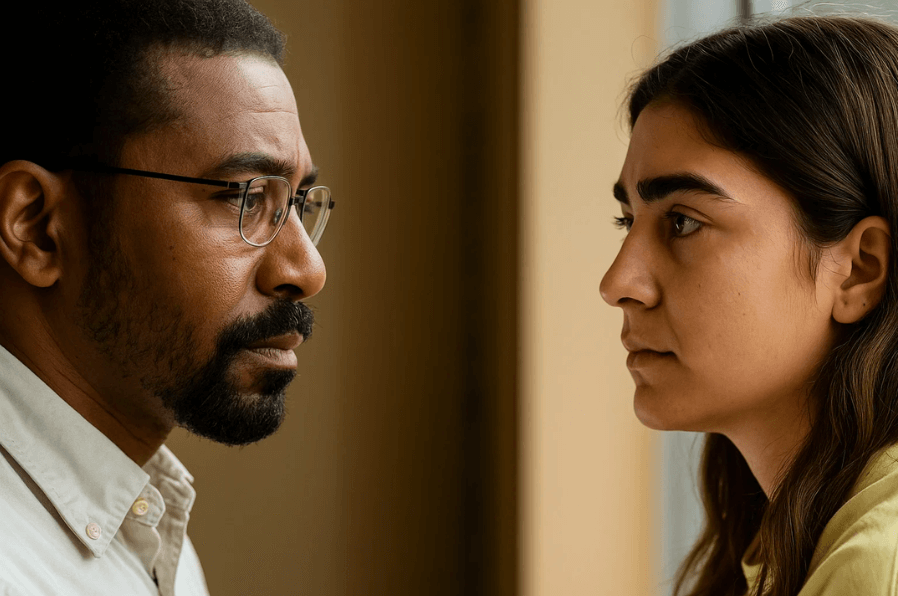Products are selected by our editors, we may earn commission from links on this page.
Disclaimer: This story is for entertainment purposes and may include fictional or enhanced elements.
Room 204 at Westbrook High. Just before lunch. History teacher Mr. Lewis noticed a silence that didn’t belong to teenagers. From the back row, Hannah Sinclair sat folded inward, pen idle, gaze fixed beyond the window. His voice carried on about the French Revolution, but his pulse no longer followed the lesson. It had locked onto her stillness, a quiet heavier than the classroom hum. Something here wasn’t ordinary, and he knew it. He didn’t call her name. He didn’t break it. That choice—so small no one else noticed—set off a chain of events that would alter both their lives for good.
The Quiet That Didn’t Belong

The classroom buzzed with routine: pencils scratching, laughter tucked into whispers, chairs shifting restlessly. But Hannah’s corner felt wrong, carrying a silence that didn’t match the room’s rhythm.
This wasn’t the silence of concentration. It carried tension, a kind of held breath, as though she wanted to vanish into her desk. Mr. Lewis felt it tug, pulling harder with every second.
He knew classrooms had invisible stories. Today, one of them sat heavy in the back row. A silence louder than noise, demanding attention he could no longer ignore.
A Teacher’s Instinct Kicks In

Fifteen years of teaching had honed instincts sharpened by experience. Mr. Lewis had seen boredom, mischief, distraction. Hannah’s quiet wasn’t any of these—it was sharp, urgent, weighted with something unspoken.
He remembered her spark earlier in the year—bright laughter, sketches curling across notebook pages. Lately, she’d dimmed. Assignments missing, eyes avoiding contact, voice retreating. Today, even her backpack was gone.
That absence wasn’t small. It was another piece of a growing puzzle. He noted every detail: trembling hands, pressed lips, shoulders curved inward. His chest tightened. These were warning signs.
The Ghost That Haunted Him

Hannah’s posture pulled him backward in time. Another student, years ago, had sat the same way. He had ignored the silence then. Weeks later, regret carved itself into his conscience.
That memory lived inside him like a scar. It reminded him that hesitation could cost lives. And Hannah’s stillness carried the same weight, pressing down until his throat felt tight.
He vowed he wouldn’t repeat the same mistake. The past screamed too loudly. Hannah’s silence wasn’t nothing. It was the first breadcrumb in a trail he couldn’t afford to lose.
Details No One Else Noticed

Sunlight striped the desks through crooked blinds, painting long shadows across lined paper. The hum of chatter carried the ordinary rhythm of teenagers starting another routine school day.
But Hannah’s desk broke that rhythm. Her chair scraped slightly, then stilled, as if she wanted to fold herself smaller. The classroom noise moved past her, but she stayed frozen.
Mr. Lewis marked the contrast: thirty students flowing in sync, and one girl suspended outside it. He couldn’t shake the thought—her silence didn’t belong to this morning at all.
Shadows That Lingered

He remembered when her presence brightened the room—quick smiles, drawings in the margins, an energy that balanced seriousness with lightness. But slowly, shadows replaced that spark, piece by fragile piece.
Assignments disappeared, laughter slipped away, even her friends noticed the distance but shrugged it off as “moods.” To Mr. Lewis, it was no mood. It was retreat.
That retreat left traces. She ate alone at lunch. Her notebook shifted from flowers to storm clouds. Every change spoke to him like fragments of a message no one else heard.
A Teacher’s Burden
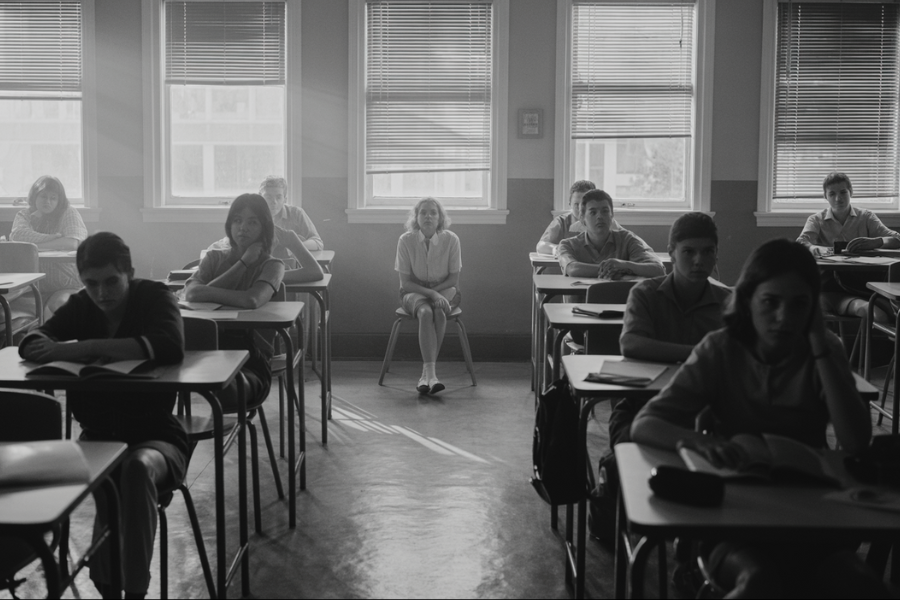
He carried ghosts with him into every classroom, invisible but heavy. One in particular—a student whose silence he had brushed aside—remained an open wound, unhealed despite passing years.
That memory shaped everything now. When he looked at Hannah, the image of that lost student overlapped her face, urging him not to repeat the same paralyzing mistake.
His duty wasn’t just to teach history. It was to notice the unspoken, to catch silence before it shattered. With Hannah, he felt the burden sharpening into responsibility.
The Girl at the Back

Hannah always chose the last row near the window. It gave her distance, a way to fade, yet still watch the world without joining its noise.
Today, that seat looked less like a preference and more like protection. Shoulders curled inward, hands hidden beneath the desk, she carried herself like someone bracing against blows no one else saw.
From his vantage point, Mr. Lewis realized her corner wasn’t just a seat. It was a fortress, and she was locked inside, unwilling—or unable—to step out.
Fractures in the Ordinary

Her pencil scratched jagged lines into paper. Not doodles of flowers, but dark shading pressed so hard the page threatened to tear. Every mark vibrated with nervous urgency.
Classmates leaned across desks, swapping jokes and glances, oblivious. To them, Hannah was simply quiet, nothing more. But to Mr. Lewis, each mark screamed louder than laughter could.
It wasn’t boredom or distraction. It was fracture. A girl unraveling one sketch at a time, sending signals hidden in plain sight, waiting for someone willing to read them.
The Memory That Wouldn’t Leave

He couldn’t look at her without seeing another face. Years earlier, one student had sat the same way—withdrawn, pale, signaling distress in silence he chose to ignore.
When the news came, it gutted him. The funeral. The staffroom whispers. The guilt that clung like ink he couldn’t wash off. That failure never left his bones.
Now Hannah sat there, repeating the same signs. The past pressed hard against the present, reminding him: ignoring silence once cost everything. He couldn’t allow it to happen again.
A Silence Too Loud

The classroom moved on—chalk against board, notes scribbled, pages turning. But every sound blurred for him. All he could hear was the unrelenting silence radiating from Hannah’s corner.
It wasn’t emptiness. It was presence. A silence so sharp it carved into him, louder than voices, heavier than laughter. It bent the air until his chest tightened.
And in that weight, Mr. Lewis recognized the truth: today’s history lesson wasn’t in the textbook. It was hidden in the silence of a girl at the back.
A Bag Left Behind

Hannah had rushed out of the house that morning with nothing but her notebook. She told her mother she’d overslept, but the truth was simpler: she couldn’t face her stepfather.
His shouting had filled the kitchen before dawn. She had learned to measure mornings by volume—quiet meant safety, yelling meant danger. That day began with slammed cupboards, accusations hurled like weapons.
Leaving the bag behind was no accident. It meant slipping out faster, avoiding another blow of words she wasn’t ready to absorb. School was her only refuge.
A History Teacher’s Dilemma

From the board, Mr. Lewis noticed the absence immediately. Books missing. Bag missing. It seemed small, but years of reading silences taught him it was another piece of the puzzle.
He wanted to ask, but Hannah’s face was unreadable. He remembered rules drilled into staff: don’t intrude, keep boundaries. Yet something about boundaries felt useless when a child was unraveling.
History waited on the chalkboard. Hannah’s silence didn’t. He chose not to ask out loud. Instead, he reached for something quieter, something she might actually trust.
The Note That Crossed the Desk
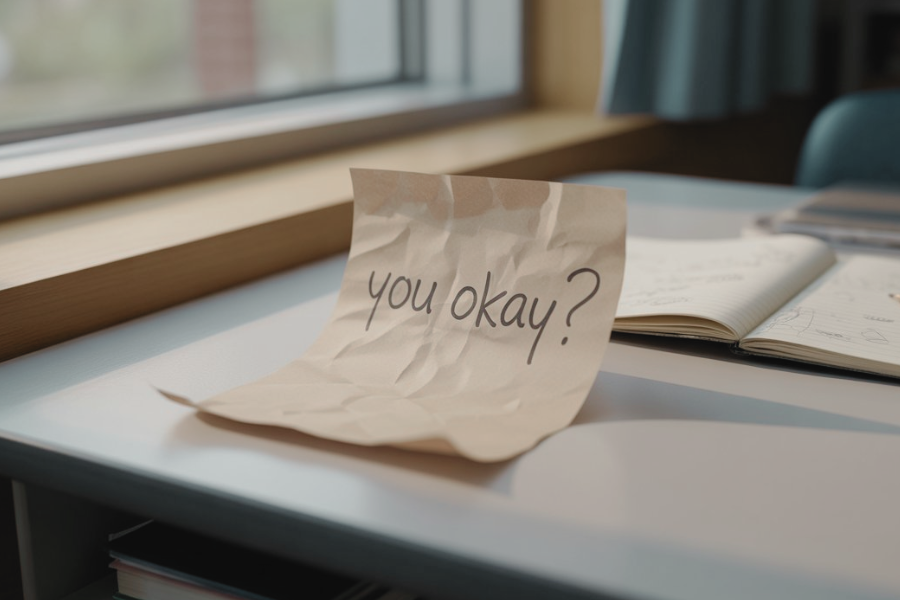
He slid the scrap of paper under her hand. Two words only: You okay? It was deliberate—short enough not to overwhelm, open enough for her to decide.
For Hannah, the note was both terrifying and relieving. Someone had noticed. Someone had cut through the walls she spent months building. But admitting truth felt like painting a target.
Her hand trembled. She shook her head faintly, pressing the paper down as if to keep it from floating away. It wasn’t much, but it was everything.
Cracks in the Fortress
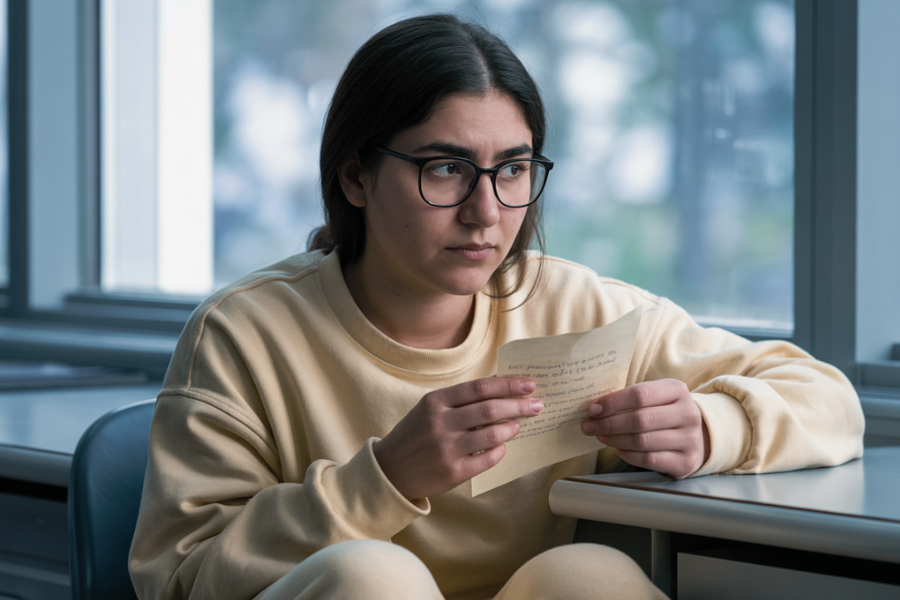
That night, Hannah replayed the gesture. Her stepfather’s voice had followed her home again, sharp, laced with threats he never acted on but always dangled like chains. Her notebook filled with storms.
She thought about the note hidden in her pocket. For the first time, she wondered if she wasn’t invisible. The thought frightened her more than it comforted her.
What if noticing meant exposure? What if speaking meant punishment? Her silence had kept her safe—or so she thought. Now someone had cracked the fortress, and she wasn’t sure what to do.
A Teacher Who Remembered Silence
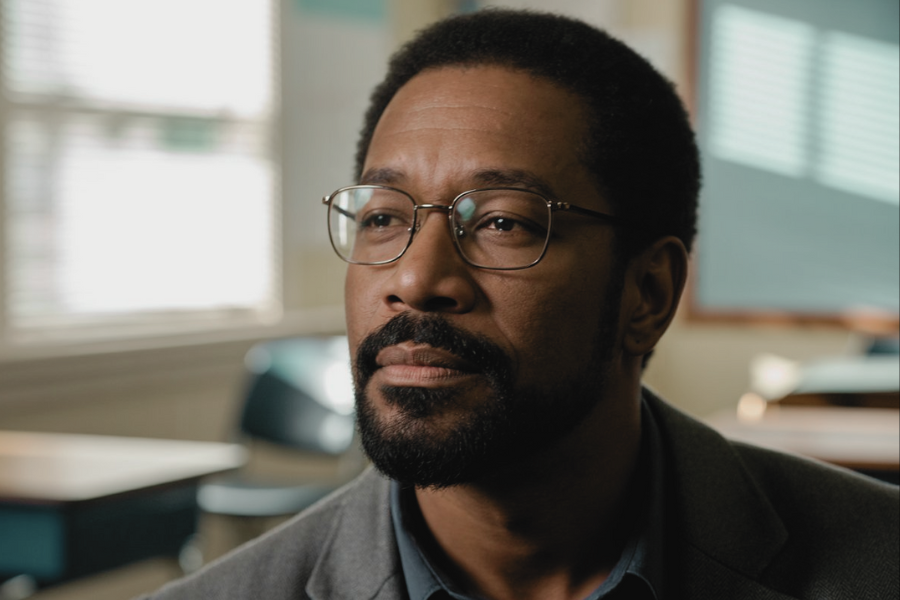
In the classroom, Mr. Lewis steadied himself. That small shake of Hannah’s head was confirmation. She wasn’t fine. He felt a scar inside him stir—the memory of the one he lost.
Years earlier, he’d seen the same cues: late arrivals, empty notebooks, shadows under eyes. He told himself then he wasn’t responsible. That lie cost a student her life.
This time he would not hesitate. Hannah’s silence had cracked, and in its fracture, she had handed him a lifeline. The question now was: would he be brave enough to hold it?
Storms in the Notebook

Her notebook had once carried doodles of flowers, suns peeking behind clouds, laughter drawn in ink. Now the pages darkened with storms, jagged strokes pressed so hard they nearly tore.
Each sketch wasn’t art but confession. Storms became her coded language. Every page let her release the chaos she couldn’t speak. It was safer to let storms live on paper.
Mr. Lewis caught a glimpse while passing her desk. To him, it wasn’t just drawing. It was testimony—a silent scream waiting to be noticed by the right eyes.
Whispers at Home

At home, silence didn’t mean peace. It meant waiting for footsteps in the hall, listening for the way the front door slammed to measure her stepfather’s mood.
Some nights, the anger was words—sharp, degrading, meant to remind her she was powerless. Other nights, his hand clenched too tightly on her wrist, a warning of what he could do.
She tried telling herself it wasn’t serious because he hadn’t crossed the final line. But the fear lived inside her bones, leaving her jumpy at every sound.
A Teacher’s Scar
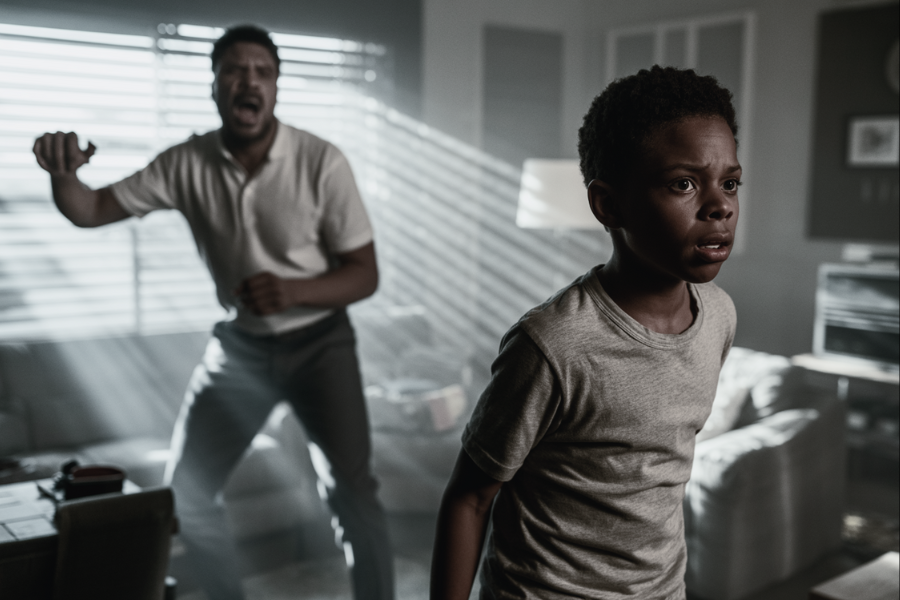
Mr. Lewis noticed her hands trembling, her pages filled with storms. It stirred something old in him—memories of other students, yes, but also a buried part of himself that never quite healed with time.
It reminded him of a boyhood shaped by slammed doors and shouted threats. A father’s unpredictable rage taught him to shrink, to hide, to endure. Fear made him quiet, but not invisible.
He’d been saved once by a teacher who simply asked, “Do you feel safe at home?” That question changed his life. Now, Hannah’s silence begged him to remember.
The Crack Widening

When Hannah caught Mr. Lewis glancing at her notebook, her stomach knotted. Exposure was dangerous. Yet something in his gaze wasn’t pity—it was recognition, as if he’d lived it too.
For the first time, she wondered if her silence had been read correctly. Not dismissed. Not ignored. Recognized. The thought unsettled her, but it also sparked something else: hope.
She tucked the notebook away quickly, but the crack had widened. Her fortress wasn’t airtight anymore. Someone had seen inside, and maybe, just maybe, it was what she needed.
The Bell That Wouldn’t End
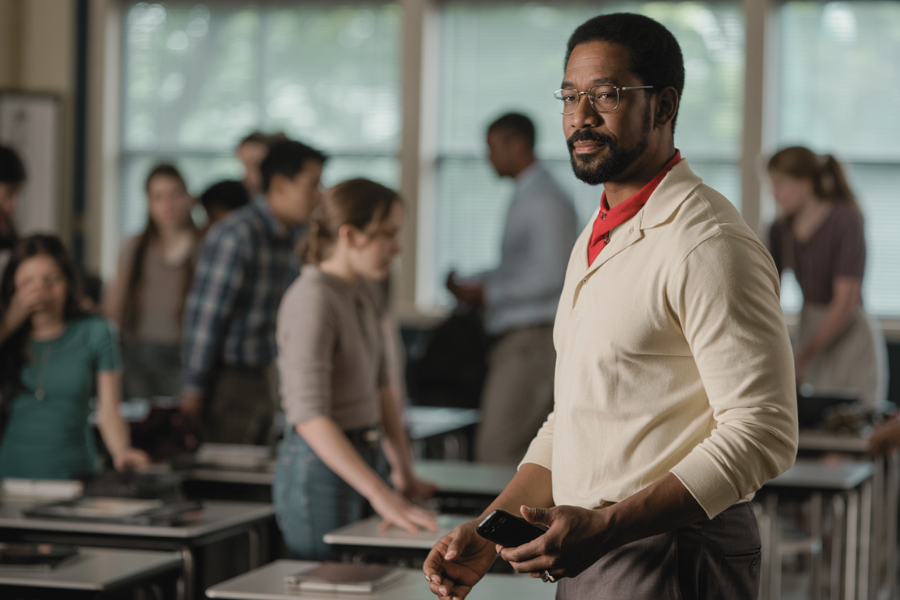
The bell rang, chairs scraped, chatter filled the air. Hannah stuffed her notebook away, relief rushing in with the noise—distraction meant she could slip out unseen, fortress intact.
But across the room, Mr. Lewis caught her eye. A subtle shake of his head, steady, firm, almost imperceptible. Stay. The message hit her harder than any spoken word.
For Hannah, it was terrifying. For him, it was decisive. He wasn’t letting her vanish into the hallway noise, not when silence had already spoken so loudly.
What Silence Had Taught Him
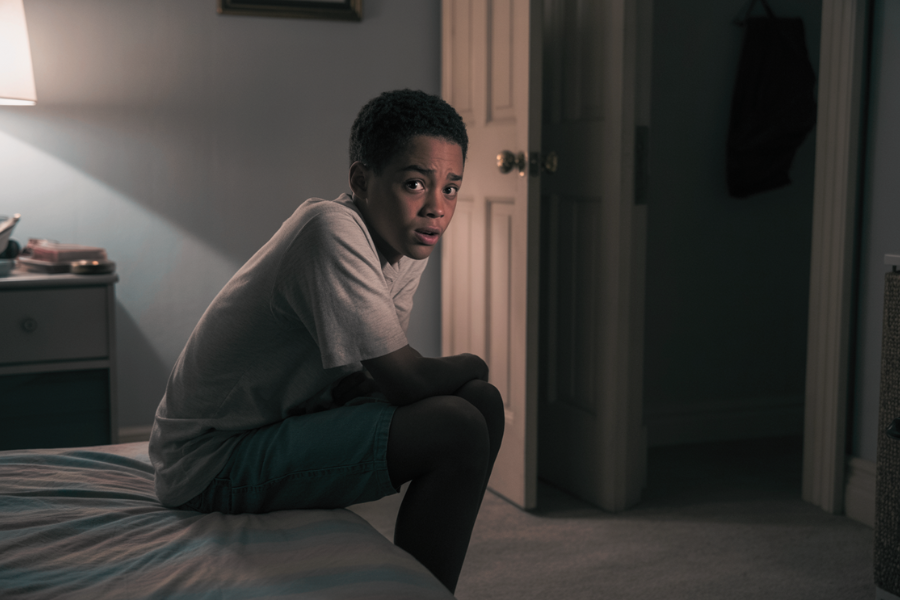
He remembered the funeral from years ago, the girl whose silence he ignored. He remembered standing outside her house, realizing too late that warnings unheeded turn into regrets carved forever.
He also remembered being twelve, sitting on the edge of his own bed, listening to his father’s footsteps in the hallway. Silence then had been unbearable, suffocating.
A teacher saved him with a question, with patience, with presence. Now, staring at Hannah, he knew: he had been handed the same role, the same chance.
A Crack Too Wide to Ignore

Hannah hesitated at her desk, frozen between escape and staying. His eyes locked on hers, not demanding, not pitying, but steady—as if he already knew more than she’d admitted.
Something shifted in her chest. Terror, yes—but also the faintest relief. She wasn’t invisible anymore. She wasn’t entirely alone in carrying this storm. Someone else had finally noticed.
She stayed seated. For the first time in months, Hannah didn’t run from silence. She let it hang, fragile, cracked open just enough for someone else to step inside.
The Hallway That Stretched Too Long

The hallway felt endless to Hannah. Lockers lined like silent witnesses, each step echoing louder than she wanted. Mr. Lewis walked ahead, calm, steady, but her stomach twisted with dread.
She wanted to turn back. To vanish into the crowd. But his presence anchored her forward. Every step carried the weight of questions she wasn’t sure she wanted to answer.
For Mr. Lewis, the hallway was familiar—he’d walked it countless times. But never had it felt so narrow, so urgent, as if each echo carried the shadow of his past failure.
A Door She Feared to Enter

The counselor’s office glowed with warm lamps, soft chairs, framed posters promising safety. Hannah saw none of it. To her, the door meant exposure, secrets ripped into daylight.
Her stepfather’s voice echoed in her head: No one will believe you. You’ll make your mother hate you. Say something and you’ll regret it. The words had roots.
Mr. Lewis paused, hand on the doorknob. For a heartbeat, his own memory intruded—twelve years old, staring at a locked bedroom door, praying for footsteps to pass by. He pushed it open.
Silence in a Safe Room

Inside, Ms. Keating waited, her smile soft but deliberate. Hannah’s body curled into the chair, arms folded, gaze locked on her knees. She wanted the floor to swallow her whole.
The counselor asked nothing at first. Just waited. The silence stretched, heavy but gentle. It wasn’t the same silence Hannah knew at home. This one didn’t threaten—it invited.
For Mr. Lewis, the stillness was excruciating. His past urged him to jump in, to speak, to fill the gap. But instinct told him: this silence wasn’t his to break.
Hannah’s War With Words

She felt the question without hearing it: Are you safe? It lived in the counselor’s quiet posture, in Mr. Lewis’s steady gaze. The answer clawed at her throat.
Telling meant danger. Telling meant she’d lose control, that the storm at home would burst into school walls. But not telling meant carrying it alone, and she was breaking.
Her lips parted, but nothing came. She shut them fast, breath hitching. It was the same war she fought nightly in her bedroom—speak and risk pain, or stay silent and suffocate.
Nights That Promised No Escape
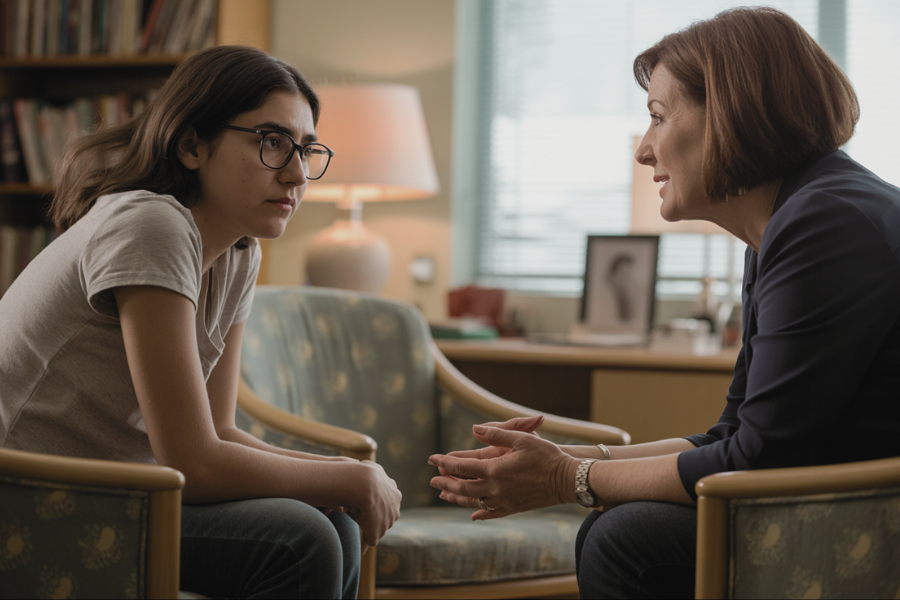
Finally, her voice cracked through the air. “It’s my stepfather,” she whispered, barely audible. She clutched her sleeves tighter. “When he’s angry… he yanks me by the arms, squeezes until I bruise, shouts in my face that no one will believe me. He says if I ever tell, he’ll do worse.” The words landed like glass shattering.
Hannah sometimes imagined slipping out the window, vanishing before dawn, leaving no trace. To disappear seemed kinder than staying, kinder than waiting for the storm to crash against her again.
The house felt alive with his rage—doors slamming, her mother shrinking into silence, even laughter on TV downstairs sharpening into warning.
The Desire to Erase Herself

There were nights she folded her notebook shut and whispered to herself: What if I just stopped? Not stopped speaking. Not stopped resisting. Stopped existing altogether.
She pictured her mother finding an empty bed, no note left, nothing explained—because explaining felt impossible. Silence had always been safer. To leave in silence seemed like mercy.
Her storms on paper weren’t drawings anymore. They were rehearsals for erasure—practicing how it might feel to vanish completely, to finally be free of the thunder that stalked her every breath.
The Mirror in His Eyes
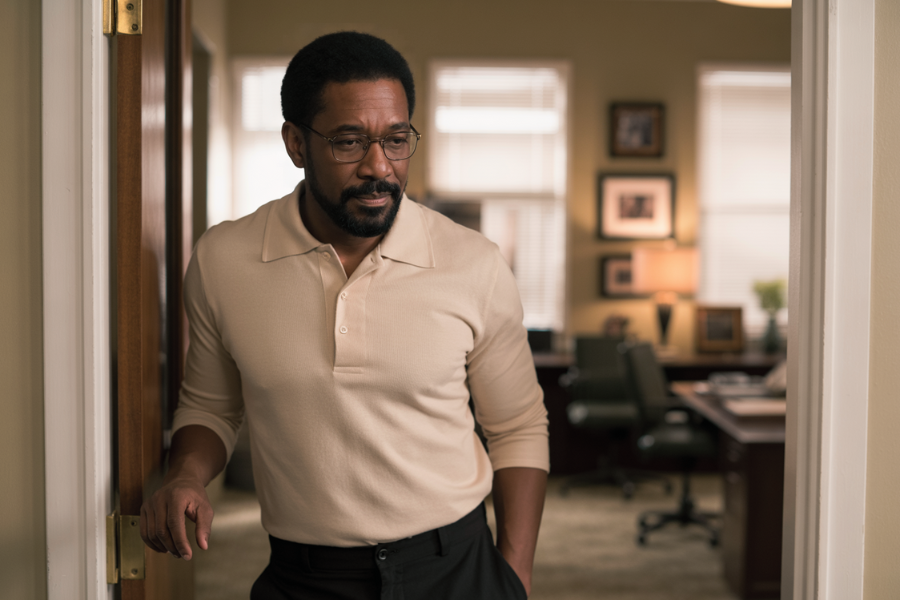
When she whispered her truth to Ms. Keating and Mr. Lewis, her words trembling into air, she didn’t see pity in his eyes. She saw recognition, as if he’d lived it too.
And he had. His father’s footsteps, slammed doors, the suffocating nights of silence—scars buried deep but never erased. It was why he noticed her, why he refused to look away.
In her urge to vanish, he saw his own past reflected. And in his steady presence, Hannah glimpsed something terrifying and impossible: the chance that someone might actually understand her pain.
The System That Stirred Awake

Ms. Keating’s face never flinched as Hannah whispered about her stepfather. But her pen moved quickly, every detail captured like evidence. These weren’t just words anymore—they were legal, actionable cries for help.
Behind her calm nods, messages were already moving: one to the principal, another to child protective services. She knew the law—threats in a household meant mandatory reporting, meant intervention beyond school walls.
Hannah thought she was unburdening secrets into the air. What she didn’t realize was that each syllable had triggered a chain—a quiet army assembling to shield her from home.
A Hug That Refused to Let Go

When Hannah stepped from the counselor’s office, her face blotched from tears, her arms suddenly wrapped around Mr. Lewis. It wasn’t delicate—it was fierce, desperate, clinging for dear life.
Her body trembled against him, shaking with everything words hadn’t said. He felt the weight of her storms press into his chest, each tremor a silent plea not to leave.
For Hannah, the embrace wasn’t gratitude. It was survival. Her hug said what her voice couldn’t: I almost let myself disappear, but you noticed. And that tether kept me alive.
A Vow Carved in Silence

Mr. Lewis held her tighter, his throat burning. He’d carried regret before—one student he failed, one silence he ignored. He swore to himself this would never happen again.
Her hug carved that vow deeper than any training, any handbook. This wasn’t protocol. It was human. A choice to stand between a child and the abyss.
He didn’t say the words aloud, but he knew them: You’re not invisible anymore. I see you. And I will not let you disappear.
The Cliff Before the Fall

Hannah pulled back finally, eyes swollen but steadier. She whispered, almost broken: “I thought I couldn’t tell anyone.” The words carried exhaustion, but also something fragile—like hope.
Mr. Lewis nodded once, steady, refusing to break the moment with promises he couldn’t guarantee. Instead, he let silence speak again, the kind that meant: You are safe now.
Yet he knew this was only the beginning. The storm wasn’t over. They stood at the cliff’s edge together, and what came next would decide if she truly survived.
The First Call for Justice

Two days later, Hannah’s stepfather was called into a meeting he didn’t expect. Ms. Keating and the principal sat steady across the table, papers in hand, words deliberate.
He tried to laugh it off, minimize the storms. But there were notes now, records of threats, Hannah’s words written in ink stronger than his denial. His smirk faltered.
For Hannah, the house didn’t transform overnight. But something shifted—his voice no longer carried unchecked power. People outside those walls now knew. For the first time, the monster had been named.
The Weight of Being Believed

At school, nothing dramatic unfolded. Hannah still sat in the back row, still sketched storms. But deep inside, a crack had widened in her silence—because this time, adults had believed her.
She thought about all the times she imagined no one would care, no one would see, no one would listen. The lie her stepfather fed her shattered the moment Ms. Keating acted.
Mr. Lewis watched her shoulders straighten gradually, not in triumph, but in quiet survival. He knew the difference belief made—it was the bridge that carried him once, now carrying her.
Consequences in the Shadows

Her stepfather didn’t vanish in handcuffs. The process moved quietly—there were no courtroom spotlights, no chains dragging him away. Instead, there were hearings, paperwork, home visits—slow gears grinding toward accountability.
He simmered afterward, quieter in public, careful in front of officials. But behind closed doors, his eyes carried calculation, as if searching for new ways to keep control without evidence.
Hannah knew danger still lived in that house. But she wasn’t defenseless anymore. Teachers, counselors, caseworkers—they all carried pieces of her truth. He could rage, but silence was no longer his ally.
The Mask of Normalcy
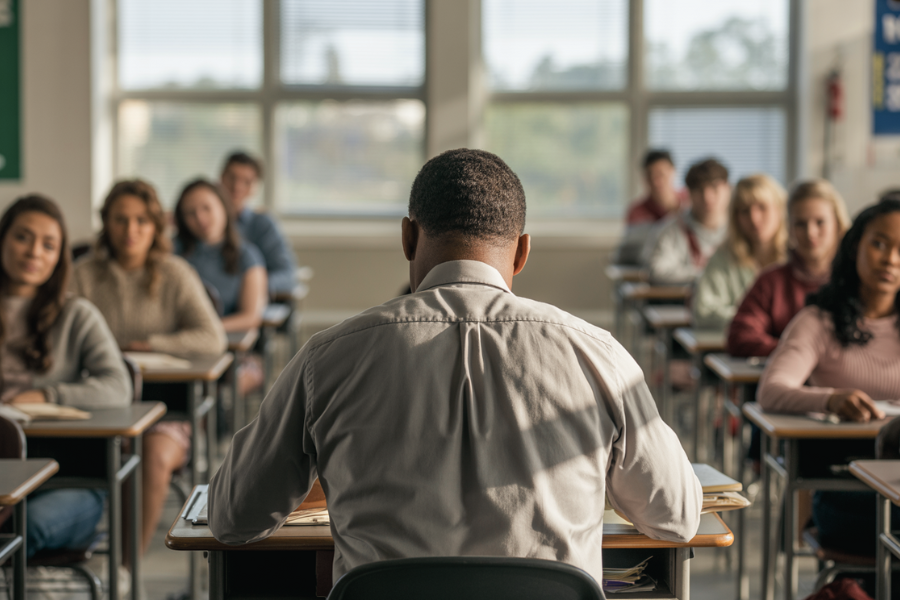
The next morning, Hannah slipped into her usual seat, notebook open, pencil poised. To anyone glancing her way, she looked no different—just another quiet student blending into routine.
But Mr. Lewis saw the armor. Her posture straighter, her face carefully neutral, the storms on her pages hidden. It wasn’t recovery; it was defense. Survival wrapped in invisibility.
He let her mask stand. Sometimes pretending was safer than revealing. He knew better than to strip away armor too soon. The classroom had to remain her shield.
The Staffroom Silence

In the staffroom, colleagues laughed over coffee, swapping complaints about printer jams and rowdy classes. Mr. Lewis sat silent, stirring his mug, Hannah’s whisper replaying endlessly in his ears.
He wanted to share, to unburden. But her story wasn’t his to scatter. Every word she trusted him with had been bought in fear. He carried it sacredly.
So he stayed quiet, laughter around him blurring, the weight in his chest heavier than any grading stack. Protecting her silence was his truest act of loyalty.
Nights of Reflection
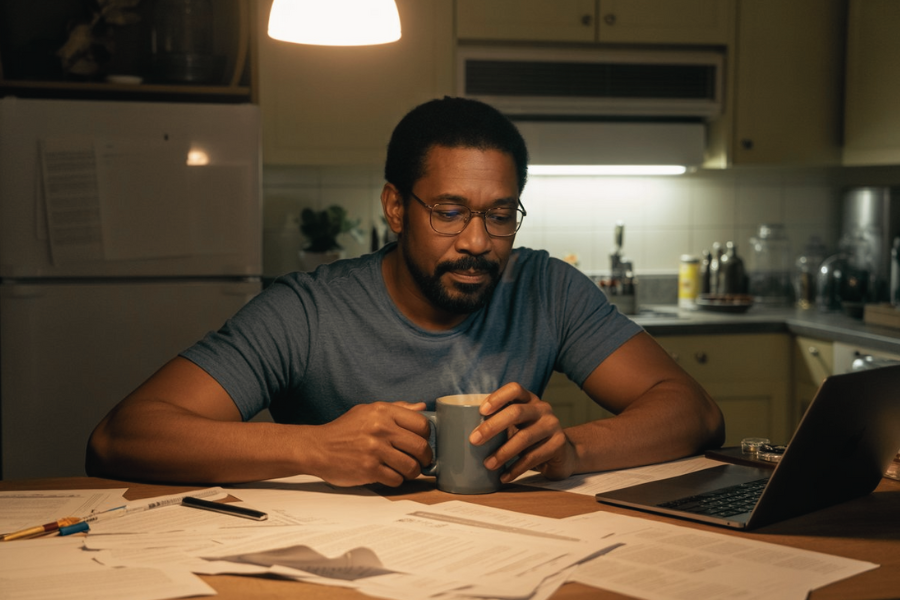
At his kitchen table, lamplight spilling over unmarked essays, Mr. Lewis sat staring at his paper works. They still felt the tremor of her hug, her desperate grip refusing to let go.
He thought of the girl he lost, the silence that ended in tragedy. He thought of his father’s storms, the childhood nights he wished someone had noticed.
Now Hannah’s survival hung on his willingness to see. The thought terrified him, but it also steadied him. This time, he had chosen differently. This time, silence had not won.
A Decade Later, the Unexpected Message

Years passed. Mr. Lewis’s hair silvered, classrooms changed, but Hannah’s silence never left him. Then one day, his phone lit up with a name he hadn’t seen in years.
The message was simple: You saved my life. Another line followed: I work in mental health now. I help others find the courage I once thought I lost.
His breath caught. He read it again, afraid the words would vanish. Hannah—alive, thriving, saving others—her storms had turned into light for those still trapped in silence.
The Line He Didn’t Expect

But the next message froze him: I didn’t just survive. I saved someone the same way you saved me. She described a boy, quiet, trembling, hiding bruises at school.
She had slid a note across his desk: You okay? She said his eyes widened, just like hers once had. And for the first time, he spoke.
Mr. Lewis stared at the screen, thunderstruck. It wasn’t just survival—it was multiplication. Silence hadn’t been the end of her story; it had become the bridge she passed on.
The Shadow That Still Haunted Her
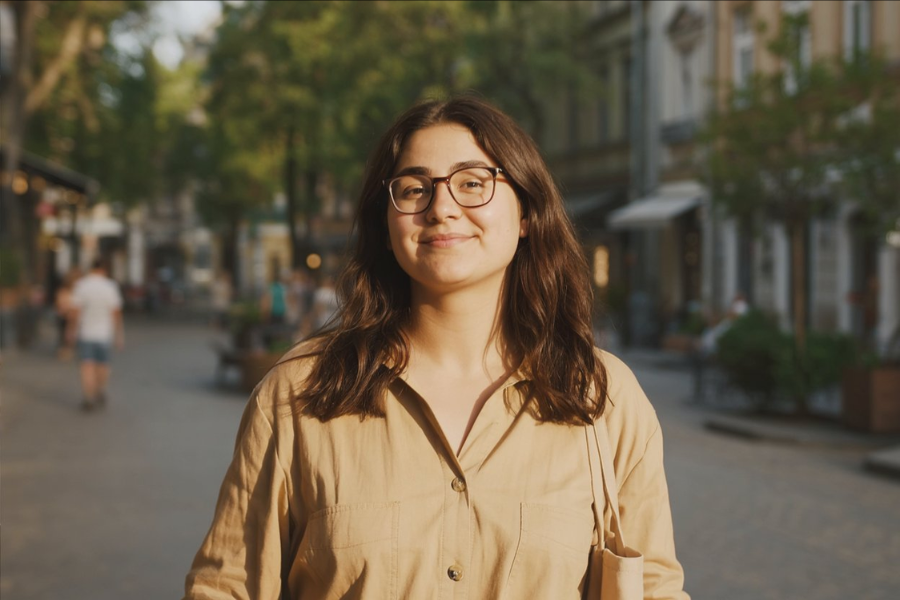
Yet Hannah didn’t pretend life was neat. She admitted: Sometimes I still hear him. The slamming doors. The threats. I wake up shaking. Trauma doesn’t disappear—it lingers.
Her stepfather never went to prison. He lived quieter after the investigations, careful under watch. But in her memory, he remained—a storm that never fully left the walls.
Still, Hannah wrote: But now I’m louder than the storm. I am not my silence anymore. Her words pulsed like thunder turned into defiance.
The Teacher Who Finally Understood

Mr. Lewis sat at his working table, tears falling freely. He had once thought the story ended with Hannah’s whisper, or maybe with her hug. He was wrong.
It wasn’t just about noticing storms—it was about what came after, how survival grew roots, how silence broken in one life could echo across generations of others.
The treasure wasn’t only that Hannah lived. It was that she carried his scar, her scar, and reshaped them into a lifeline for strangers. Redemption multiplied beyond imagination.
The Lifeline Hidden in Silence
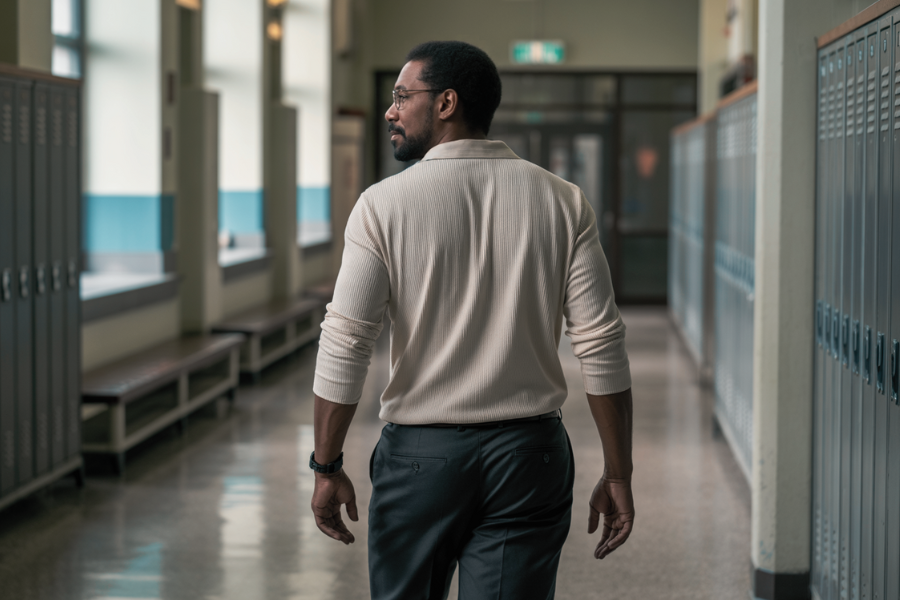
For years, he had believed silence destroyed. And it did. But now he saw it differently—silence could also be the canvas for connection, for gestures, for unspoken lifelines.
A note. A nod. A hug. These had carried Hannah forward, carried him forward, carried countless others forward. What once broke him had become the very thread binding them together.
The deepest love, the truest courage, wasn’t loud. It hid in stillness, survived in absence, and revealed itself only when one broken silence saved another from breaking completely.
The Echo That Belongs to Us

What happened between Hannah and Mr. Lewis wasn’t just survival. It was proof that the smallest choices—three words on paper, a steady glance, a vow of silence kept—can alter a life’s direction.
We may never stand in his classroom or sit in her chair, but all of us walk past storms every day. Some hide in coworkers, friends, strangers on trains.
The question is whether we’ll see them. Because sometimes, the difference between despair and survival is simply one person daring to notice—and daring to stay when silence begs them not to. If someone lingers on your mind, reach out. Even in silence. Because the lifeline you extend may not only save them—it may echo forward, saving more lives than you’ll ever know.




